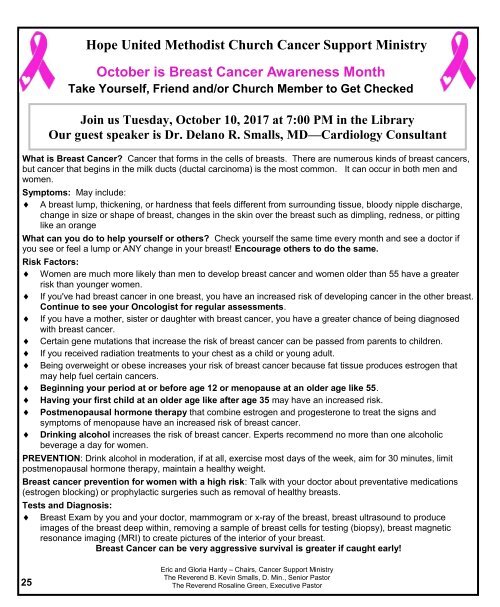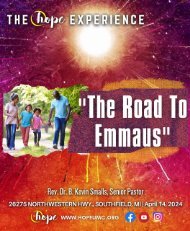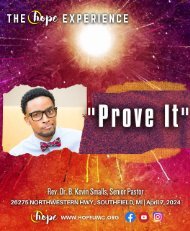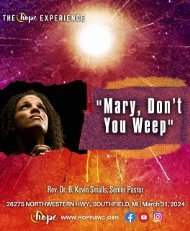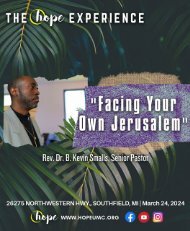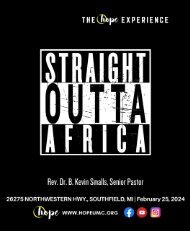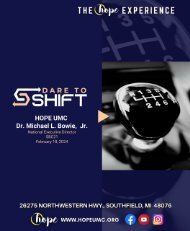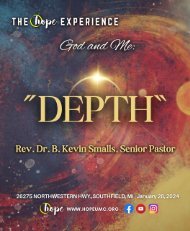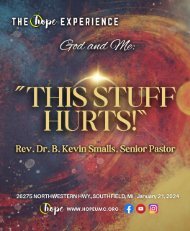You also want an ePaper? Increase the reach of your titles
YUMPU automatically turns print PDFs into web optimized ePapers that Google loves.
Hope United Methodist Church Cancer Support Ministry<br />
October is Breast Cancer Awareness Month<br />
Take Yourself, Friend and/or Church Member to Get Checked<br />
Join us Tuesday, October <strong>10</strong>, 2<strong>01</strong>7 at 7:00 PM in the Library<br />
Our guest speaker is Dr. Delano R. Smalls, MD—Cardiology Consultant<br />
What is Breast Cancer? Cancer that forms in the cells of breasts. There are numerous kinds of breast cancers,<br />
but cancer that begins in the milk ducts (ductal carcinoma) is the most common. It can occur in both men and<br />
women.<br />
Symptoms: May include:<br />
A breast lump, thickening, or hardness that feels different from surrounding tissue, bloody nipple discharge,<br />
change in size or shape of breast, changes in the skin over the breast such as dimpling, redness, or pitting<br />
like an orange<br />
What can you do to help yourself or others? Check yourself the same time every month and see a doctor if<br />
you see or feel a lump or ANY change in your breast! Encourage others to do the same.<br />
Risk Factors:<br />
Women are much more likely than men to develop breast cancer and women older than 55 have a greater<br />
risk than younger women.<br />
If you've had breast cancer in one breast, you have an increased risk of developing cancer in the other breast.<br />
Continue to see your Oncologist for regular assessments.<br />
If you have a mother, sister or daughter with breast cancer, you have a greater chance of being diagnosed<br />
with breast cancer.<br />
Certain gene mutations that increase the risk of breast cancer can be passed from parents to children.<br />
If you received radiation treatments to your chest as a child or young adult.<br />
Being overweight or obese increases your risk of breast cancer because fat tissue produces estrogen that<br />
may help fuel certain cancers.<br />
Beginning your period at or before age 12 or menopause at an older age like 55.<br />
Having your first child at an older age like after age 35 may have an increased risk.<br />
Postmenopausal hormone therapy that combine estrogen and progesterone to treat the signs and<br />
symptoms of menopause have an increased risk of breast cancer.<br />
Drinking alcohol increases the risk of breast cancer. Experts recommend no more than one alcoholic<br />
beverage a day for women.<br />
PREVENTION: Drink alcohol in moderation, if at all, exercise most days of the week, aim for 30 minutes, limit<br />
postmenopausal hormone therapy, maintain a healthy weight.<br />
Breast cancer prevention for women with a high risk: Talk with your doctor about preventative medications<br />
(estrogen blocking) or prophylactic surgeries such as removal of healthy breasts.<br />
Tests and Diagnosis:<br />
Breast Exam by you and your doctor, mammogram or x-ray of the breast, breast ultrasound to produce<br />
images of the breast deep within, removing a sample of breast cells for testing (biopsy), breast magnetic<br />
resonance imaging (MRI) to create pictures of the interior of your breast.<br />
Breast Cancer can be very aggressive survival is greater if caught early!<br />
25<br />
Eric and Gloria Hardy – Chairs, Cancer Support Ministry<br />
The Reverend B. Kevin Smalls, D. Min., Senior Pastor<br />
The Reverend Rosaline Green, Executive Pastor


